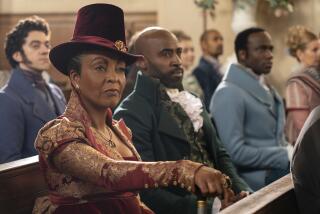Why is Regé-Jean Page leaving Netflix’s ‘Bridgerton’?
Fans of Netflix’s hit period piece “Bridgerton” were shocked by the news Friday that the show’s romantic lead and breakout star, Regé-Jean Page, would not appear in Season 2.
The British actor — who played the dashing and commitment-wary Simon Basset, the Duke of Hastings — was crucial to the success of “Bridgerton,” which quickly took off with viewers hooked on this story of romance told through a contemporary lens.
Even the unflappable Kim Kardashian was stunned by the announcement of Page’s departure, commenting with a flabbergasted “Wait!!! WHAT???” on “Bridgerton’s” Instagram post.
The explanation offered by people close to the Shondaland production raised additional questions. Page told Variety that Simon’s story, of an aristocrat whose fake courtship with the beautiful Daphne Bridgerton (Phoebe Dynevor) becomes unexpectedly complicated, was always going to follow a self-contained, single-season arc. Page was signed to a one-season contract, according to people familiar with the matter who were not authorized to comment.
Similar to the Julia Quinn novels, each of which focuses on a different Bridgerton sibling and their romantic foibles, Netflix already indicated that Season 2 would follow Daphne’s brother Lord Anthony (Jonathan Bailey) and his quest to find a viscountess. Season 2 begins filming this spring,
But surely creator Chris Van Dusen and his writers could have found a way to keep the Simon and Daphne drama brewing.
Regé-Jean Page won’t say if he’s dating ‘Bridgerton’ costar Phoebe Dynevor. But he likes the rumor that he’ll be the next James Bond.
Netflix’s announcement made it clear that Daphne would continue to be part of the show, perhaps an indication that it was ultimately Page who was behind the breakup. And why wouldn’t the companies have sewn up Page’s Season 2 participation in his contract?
Page’s one-year deal may be the latest sign of how talent deals are shifting amid the entertainment industry’s brisk shift to streaming.
For a show on a broadcast network, a typical deal would have “basically infinite options for the studio to exercise after each season, and they can lock in talent for as long as they want essentially,” said Nick Soltman, an entertainment business attorney at Kinsella Weitzman Iser Kump.
Darrell Miller, an attorney at Fox Rothschild who negotiates contracts on behalf of talent, producers and directors, called the exit an “extremely unique” situation.
“It is a cardinal rule to have options on the lead actors in a series,” Miller said. “This situation is extremely unique and it could blow up the show and turn off many female viewers who loyally watched Season 1 because of Regé-Jean Page.”
Netflix declined to comment beyond an announcement through social media accounts in the voice of “Bridgerton’s” gossip writer character, Lady Whistledown.
Page certainly wouldn’t be the first actor to walk away from a star-making romantic role in a period piece. “Downton Abbey” viewers were traumatized by the dramatic departure of actor Dan Stevens — a.k.a. Cousin Matthew — who left the hit series after three seasons in 2012.
Still, Page’s exit is surprising. Eighty-two million households watched some of the series in its first four weeks of release, making it the most successful original series in Netflix’s history, according to the streamer.
The series instantly turned Page, who previously appeared in the short-lived ABC drama “For the People” and the 2018 remake of “Roots,” into a star. Within days of “Bridgerton’s” debut, Page was rumored to be in the running to become the next James Bond. In February, he hosted “Saturday Night Live,” gamely sending up his heartthrob image and “Bridgerton’s” steamy sex scenes.
The practice of bringing back stars indefinitely can cause conflicts, as in 2019 when “Crazy Rich Asians” star Constance Wu publicly expressed dismay that her show “Fresh Off the Boat” was being renewed for a sixth season on ABC, which prevented her from doing other things.
Netflix’s “The Serpent,” about serial killer Charles Sobhraj, had to “pedal back” on several strange details in the case. Here’s what’s fact and what’s fiction.
Having as many episodes as possible makes sense for broadcast shows as long as advertisers are happy with the ratings. Broadcast series also produce a massive windfall if they stay on the air long enough to achieve syndication.
In streaming, however, the goal is to draw paying subscribers and there’s little incentive to extend even the most popular shows for more than a few years. In that case, Soltman said, it wouldn’t be surprising to have a one-year contract for a limited series or a show with a plan to focus on different characters in each go-round.
“In the streaming world, this structure makes a lot more sense and would be a lot more prevalent than in the network world,” Soltman said of single-season talent deals. “Netflix has kept very few shows on for Season 4 and beyond. The streaming world isn’t necessarily built for long-running shows. They tend to get more expensive as time goes on and they don’t bring a whole lot of incremental value beyond the first couple seasons.”
The instant fame that came with “Bridgerton” likely brought new opportunities that would’ve conflicted with shooting another season. Social media quickly speculated about new roles for Page, including in Marvel’s “Black Panther” franchise.
“Bridgerton” is the first series from mega-producer Shonda Rhimes under her lucrative deal at Netflix — and it has been an unqualified success. It is a soapy hit full of over-the-top plot twists, complicated female roles and swoon-worthy declarations of love familiar to fans of the Shondaland dramas “Scandal” and “Grey’s Anatomy.
At a time when Hollywood is often criticized for racial and ethnic disparities, “Bridgerton” won acclaim for its modern take on the period costume drama — complete with a diverse cast, including a Black queen.
Netflix broke the news of Page’s departure via “Bridgerton’s” social media accounts.
“We’ll miss Simon’s presence onscreen, but he will always be a part of the Bridgerton family,” read the announcement.
More to Read
Inside the business of entertainment
The Wide Shot brings you news, analysis and insights on everything from streaming wars to production — and what it all means for the future.
You may occasionally receive promotional content from the Los Angeles Times.











